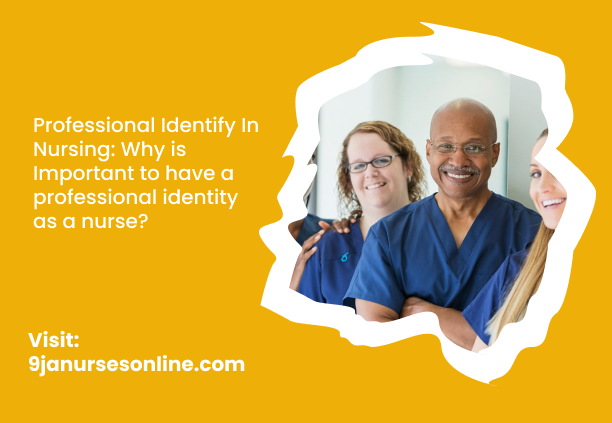You might be surprised to learn that the term Professional Identity In Nursing, it is extensively utilized in other industries. Nursing is said to be a very ancient profession but a very young discipline. Unlike in other disciplines, professionalism in nursing has not been fully defined. Individuals must have a strong sense of professional identity, which begins in the classroom, for regulatory, practice, and instructional objectives.
In this article, we will discuss what professional identity in nursing is, the components of professional identity, the importance of having a professional identity, and how to develop a professional identity as a nurse
What is Professional identity in Nursing?
Professional Identity in Nursing is defined as “a sense of oneself, and in relationship with others, that is influenced by characteristics, norms, and values of the nursing discipline, resulting in an individual thinking, acting and feeling like a nurse.
National League for Nursing defines the attainment of a professional identity when a nurse internalizes and reflects on the core values of the nursing profession, engages in personal and professional development, and gains experience in the practice setting while growing in the profession.
Read Also: Professional Liability Insurance Vs General Liability
Nurses begin to form a professional identity in nursing school by embracing nursing’s basic values and engaging with student peers, nursing educators, and patients. As they begin to think, feel, and perform like a nurse, students blend critical thinking and clinical reasoning with these basic principles.
What are the domains of professional identity in nursing?
The following are the domains of professional identity in nursing ;
- Values and ethics– These are the fundamental principles that govern the behavior of a people. These include honesty, compassion, and empathy.
- Knowledge- Ability to examine and apply knowledge gained from nursing and other professions, as well as experience, clinical reflection, and scientific discovery. This includes clinical judgment, recognizing cues and patterns e.t.c
- Nurse as Leader -Motivate oneself and others to make a common goal a reality. Be an effective communicator, negotiate conflicts, and advocate for patients.
- Professional comportment – professional conduct of a nurse as shown by words, actions, and presence. This includes being resilient, confident, respectful,l and patient-centered.
Why is having a professional identity as a nurse important?
Developing a professional identity in nursing is most likely driven by self-confidence and the capacity to collaborate with others to enhance the workplace and affect patient outcomes.
A professional image is an external manifestation of a nurse’s professional identity’s deep, personal, and internalized process.
Knowing your own professional identity and assisting others to get to where you are via coaching and mentoring are critical components of being a nurse leader.
How do I develop a professional identity as a Nurse?
- Create a personal nursing philosophy to serve as a framework for your practice. How would you define your worldwide values on nursing, personhood, health, and the environment? What are the effects of loving relationships on health, healing, and successful communication and collaboration? How can patient-centered care provide safe, high-quality care and promote favorable patient outcomes?
- Participate actively in professional nursing organizations. These organizations disseminate clinical practice, teaching, administration, and research standards. While still in nursing school, students can begin serving in professional organizations such as the National Student Nurses Association.
- Obtain higher degrees and certificates following your job objectives. Continuous learning in nursing practice is required for competence. Nurses interested in positions of leadership in healthcare organizations should consider obtaining a bachelor’s degree in nursing. A master’s degree in nursing is frequently requested. Nurses who want to be NPs or educators must have a master’s or doctorate.
- Aim for leadership positions. Leaders value diversity, equity, and inclusion whether they are at the bedside, in managerial roles, teaching in a healthcare organization or academic context, or engaging in committee or community activities.
- Establish a professional appearance. A professional image enhances a nurse’s credibility, which begins with academic attainment, practice experience, and good verbal and nonverbal communication skills. Relationship development is facilitated by a friendly approach and countenance, being compassionate, spending time with people, and attentively listening.
Most Read: How to make Money while in Nursing schools
Encouraging professional identity in nursing education, practice, and regulation is an example of an evidence-based intervention that has the potential to transform workplaces into environments that support nurse well-being, prevent burnout, fatigue, mental and physical stress, moral distress, and moral injury, and promote job satisfaction and retention.
I you find this article helpful please this article with friends and if you have any question you can drop in the comment. join our question and answer platform by clicking HERE



